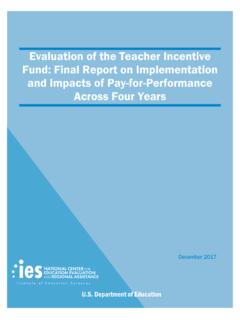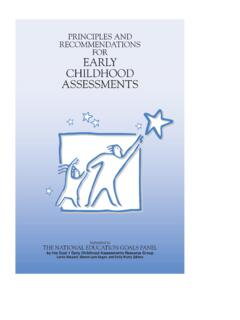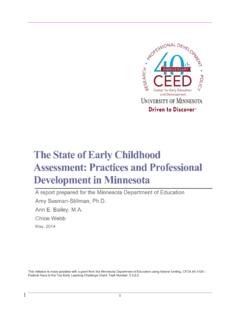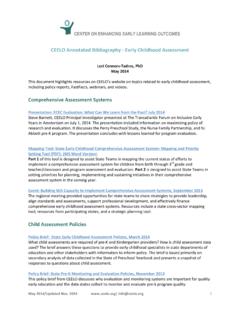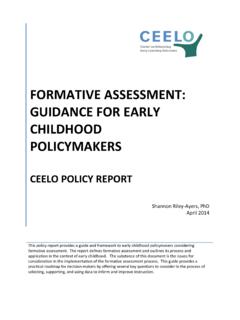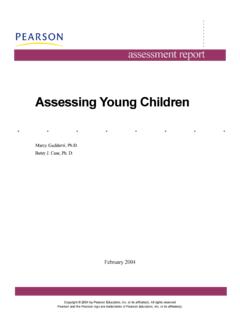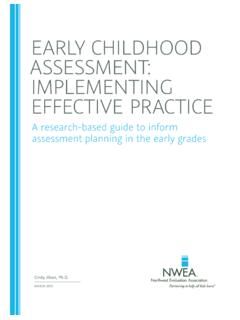Transcription of Early Childhood Educator and Administrator Surveys on the ...
1 Early Childhood Educator and Administrator Surveys on the use of assessments and standards in Early Childhood settingsClare W. Irwin, Education Development Center, O Dwyer, Boston CollegeKyle DeMeo Cook, Education Development Center, partnership with the Early Childhood Education Research Alliance (ECEA), Regional Educational Laboratory Northeast & Islands has developed two new Surveys on the use of child assessments and learning standards in Early Childhood learning settings. The Early Childhood Educator survey and the Early Childhood Administrator survey allow users to collect consistent data to relate program implementation to child are these Surveys ?Each survey includes three modules: one on Educator / Administrator background information ( Module 1. Background information ), one on assessment use ( Module 2. Child assessments ), and one on imple-menting Early learning standards ( Module 3.)
2 Early learning standards/guidelines ). The Surveys and modules may be administered together or Surveys are part of a research agenda to improve Early Childhood programming and child outcomes through research- and evidence-based these Surveys ?The Surveys in this report are intended for use by program administrators and policymakers to inform Early Childhood practice and policy. Data regarding how Early Childhood educators and administrators use child assessments to inform instruction, talk with families about their children, or adjust programs is not readily available. Likewise, information on how Early Childhood educators are implementing state Early learning standards is not generally collected. Having access to such data would allow program and state administrators and policymakers to make better informed decisions regarding choice of child assessments, strengths and weaknesses of programs, and professional development needs, among other things.
3 Department of EducationAt Education Development Center, to administer these surveysThe Early Childhood Educator survey and the Early Childhood Administrator survey can be used to collect data from Early Childhood classroom educators (including family child care practitioners) and program administrators regarding child assessment use and standards implementation. Module 1 can be used to collect information on program, Educator , and child characteristics that can contextualize survey results. The Surveys may be administered at the same time or separately. Administration time varies by module. Based on a small pretest sample, the developers anticipate Module 1 taking no more than 10 minutes and Modules 2 and 3 each taking about 15 to use these surveysData have not yet been collected to allow for psychometric analyses of the developed Surveys (for example, reliability and validity information).
4 Pretesting with a small sample (fewer than nine) of educators and administrators suggests that the items should yield the intended information. At this point no information related to scales is available. Future work will include structural and psychometric analyses including frequencies and cross-tabulations of item responses should be appropriate at this time. It is not recommended that these Surveys be used for high-stakes decisions, including Educator evaluation or program funding decisions. Data should be evaluated in aggregate for program-, state- or region-level decisions regarding topics such as professional development needs and other supports for edu-cators and Early learning The following ECEA members were integral to the development of the Surveys : Manuela Fonseca (Vermont), Jennifer Louis (Massachusetts), Sarah Mahurt ( Virgin Islands), Kathleen Paterson (Vermont), Judi Stevenson-Garcia (Rhode Island), and Ellen Wheatley (New Hampshire).
5 Early Childhood Educator SurveyModule 1. Background information 1 Module 2. Child assessments 5 Module 3. Early learning standards/guidelines 121 Module 1. Background information1. Please list your current position: _____2. What is the highest level of education you have completed? Less than high school diploma Bachelor s degree GED Master s degree High school diploma Doctorate or professional degree Some undergraduate (no degree) Some graduate (no degree)Please specify: _____Please specify: _____ Associate s degree Other: _____3. Do you hold a degree in Early Childhood education? Ye s No Currently working on a degree in Early Childhood education4. Do you hold a degree in a field related to Early Childhood education (for example, elementary educa-tion, special education, human development, sociology, or psychology)? Ye s No Currently working on a degree in a related field5.
6 What state certification(s)/qualification(s) do you hold? (Check all that apply.) None Director II qualified Teacher qualified Early Childhood preK 2 license Lead teacher qualified Not applicable Director I qualified Other: _____ CDANote: The answer choices for this question will be tailored for each Including this year, how many years have you been working with children 0 5 years old (excluding your own children)? _____7. Including this year, how many years have you been in your current position? _____8. What is your primary language? English Spanish Other _____9. What languages do you speak fluently? (Check all that apply.) English Spanish Other _____10. Do you work full-time or part-time? Full-time Pa r t-t i me Va r ie s11. What type of Early learning program do you work for? (Check all that apply.) Independent family child care Public school Family child care system After school Small center based Head Start Large center based Early Head StartNote: The answer choices for this question will be tailored for each What age group(s) do you primarily work with?
7 (Check all that apply.) Infants (approximately birth to 1 year) Kindergarteners (approximately 5 6-years) Toddlers (approximately 1 3 years) School-age children (approximately 6+ years) Preschoolers (approximately 3 5 years)313. How many children are in your classroom on an average day? 1 5 16 20 6 10 21 25 11 15 26+14. What is the age of the youngest child in your classroom? < 6 months 3 years 6 months to 1 year 4 years 1 year 5 years 2 years 6+ years15. What is the age of the oldest child in your classroom? < 6 months 3 years 6 months to 1 year 4 years 1 year 5 years 2 years 6+ years16. What percentage of the children in your classroom come from homes where English is not the primary language? 10 51 75 11 25 > 75 26 5017. How many children in your classroom attend 4 or more days per week? _____18. How many children in your classroom attend 3 or fewer days per week?
8 _____419. How many children in your classroom are enrolled full-day? None More than half Less than half All Half20. How many hours of professional development related to Early Childhood education are staff members required to attend each year? None 10 14 1 4 15 19 5 9 20+21. How many hours of professional development related to Early Childhood education do you attend each year? None 10 14 1 4 15 19 5 9 20+5 Module 2. Child assessmentsThe following survey asks about your program s policies related to formal child assessments, assessment use, and use of assessment the purpose of this survey , a formal child assessment is defined as a test, survey , observation, portfolio, or other formal collection of child data (for example, [INSERT STATE-SPECIFIC EXAMPLES HERE]).Unless otherwise stated, we are interested in your use of all formal child assessments, not just those that are required by your program, parent company (for example, KinderCare), or What methods do you use to obtain information about child well-being, development, and progress?
9 (Check all that apply.) Informal observations Conversations with parents/families Notes about child activities and projects Don t k now Past experience with similar children Other: _____2. Do you use formal child assessments in your classroom? Ye s NoIf you do not use any formal assessments, you may discontinue the child assessments survey . Thank you for your Who develops written assessment -related policies that pertain to your classroom? (Check all that apply.) There are no written policies related to School district or state personnelassessments My program s parent company or organiza- Program Administrator (s)tion (for example, KinderCare) Te a c h e r (s) Don t k now Other staff member(s) (for example, Other: _____c o ache s)64. Which children are required to be assessed in your classroom? (Check all that apply.) My program does not require any children All childrento be assessed Special needs/developmental delay Infants (approximately birth to 1 year) English language learner students Toddlers (approximately 1 3 years) Typically developing Prekindergarten (approximately 3 5 years) Other: _____ School-age5.
10 Does your program provide child assessments that teachers are expected to use? Ye s No6. How often do you review assessment data? At least weekly Once a year Twice a month Never Once a month No assessment data to review Once every 2 3 months Other: _____ Twice a year7. For what purpose(s) do you review assessment data? I use assessment data to:None of the time Some of the time Most of the timeNot applicablePlace children into instructional groups Inform lesson planning Inform center activities Inform circle-time and large-group activities Make decisions about curricula Use during conferences with parents/families Plan with other teachers Check that children are meeting developmental targets Other: _____ 78. Are teachers at your program required to participate in professional development related to the use of assessment data? Ye s No Don t k now9. Who provides professional development related to the use of assessment data?



